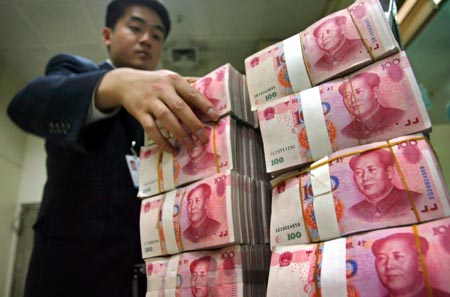Economists marked the first anniversary of the yuan's revaluation on Friday
with a barrage of policy recommendations, including a faster rise in the
currency and a wider trading band, to address China's economic imbalances.

An
employee arranges yuan notes at a branch of the China Minsheng Bank
in Nanjing, capital of east China's Jiangsu province. Economists
marked the first anniversary of the yuan's revaluation on Friday
with a barrage of policy recommendations, including a faster rise in
the currency and a wider trading band, to address China's economic
imbalances.
[Reuters] | |
Ba Shusong, vice head of the financial research institute at the Development
Research Centre (DRC), said Beijing needed to introduce greater currency
flexibility to help cool speculation and rein in excess liquidity.
"Considering rampant liquidity, it's necessary to adopt a more flexible
exchange rate regime by widening its floating band," the China Securities
Journal quoted Ba as saying. His think tank reports directly to the State
Council, China's cabinet.
A wider trading band would also increase the cost and risk for speculators of
betting on the yuan, he said.
Under the new regime introduced a year ago, the yuan was revalued by 2.1
percent after being untethered from a decade-old dollar peg and it now floats in
managed bands with reference to a basket of currencies.
The yuan may move 0.3 percent up or down from a midpoint against the dollar
set each day by the central bank, although in practice it does not move nearly
so far.
The midpoint on Friday was set at 7.9897 per dollar, which is 1.5 percent
stronger than the 8.11 rate set in the revaluation.
Indeed, China International Capital Corp calculates that since the
revaluation the yuan's real effective exchange rate had fallen 0.3 percent by
June 30, the China Securities Journal said.
Calls among economists to let the yuan rise faster to help ward off economic
overheating have gained momentum after data this week showing the economy grew a
surprisingly strong 11.3 percent in the second quarter from a year earlier.
Pace To Quicken?
Goldman Sachs told clients to go long of yuan versus the dollar through
two-year non-deliverable forwards, offshore instruments used by foreigners to
bet on the future value of the yuan.
"Yuan appreciation is an essential part of a policy tightening package, which
can substantially rebalance the economy," economists Jens Nordvig and Thomas
Stolper said in a note.
Goldman said the risk was that the yuan would continue to appreciate at the
annual pace of 2 percent witnessed in the first half. But the bank said it
believed the pace would quicken. It expects a 6-7 percent appreciation over the
next 12 months.
Xia Bin, head of the financial research institute at the DRC, called for
faster yuan appreciation to tackle problems arising from excessive banking
liquidity, but he poured cold water on the idea that letting the yuan rise
would, by itself, help resolve global imbalances.
"The role of the yuan exchange rate in China's trade with the United States
is limited, but that does not mean that we should give up our efforts to deepen
exchange rate reforms," Xia told the China Business News in an interview.
Xia called for the United States to do its bit to correct global imbalances
and not just rely on currency adjustments in China.
Xia said allowing the yuan to appreciate 2-3 percent a year would not have a
big impact on China's economy.
He Fan, an economist at the Chinese Academy of Social Sciences, a government
think tank, said he believed China could live with a faster yuan appreciation of
5 to 10 percent.
"We cannot use the exchange rate as the only lever to tackle investment
overheating and trade imbalances, but the exchange policy must be part of a
package of policy measures," the China Securities Journal quoted him as saying.
The government has promised deep-seated structural changes to boost
consumption and reduce savings and is also considering a cut in tax rebates for
exporters.